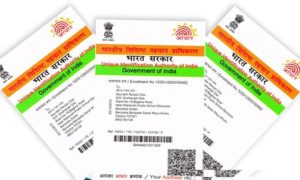Banks can use customers’ Aadhaar number for the know-your-customer (KYC) process but only with customers’ consent. “Banks will be allowed to carry out Aadhaar authentication or offline-verification of an individual who voluntarily uses his Aadhaar number for identification purpose,” the Reserve Bank of India (RBI) said in circular last week.
The Central bank has also said that proof of possession of Aadhaar number has been added to the list of officially valid documents (OVD). If you receive direct benefit transfer (DBT), you have to provide your Aadhaar and also get an E-KYC authentication.
IT IS NOT MANDATORY
You can voluntarily provide your Aadhaar number to open a bank account. However, the bank can’t use your Aadhaar without your consent. If you permit to use your Aadhaar, banks can use it for online authentication and E-KYC. Other regulated-entities such as non-banking finance companies can also use your Aadhaar with consent for KYC.
However, companies other than banks which are permitted to use Aadhaar can use it only in offline mode and not for an E-KYC. Any company that is allowed to use your Aadhaar for customer due diligence will have to blackout the Aadhaar number.
WHAT IT MEANS FOR YOU?
Aadhaar has also been accepted as one of the officially valid documents. After the Supreme Court verdict on Aadhaar in 2018, banks had stopped opening accounts online using Aadhaar and E-KYC. Similarly, fintech companies has stopped adding customers through E-KYC for payments and lending.
The Aadhaar-based KYC was used for e-signature. Now the RBI has allowed Aadhaar KYC with consent. So banks and fintech companies will offer customers E-KYC and Aadhaar-based account-opening processes. Fintech companies were also working on using new technology to do KYC through video and voice assistance.
For more updates: Like us on Facebook and follow us on Twitter & Instagram





































